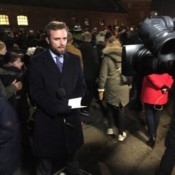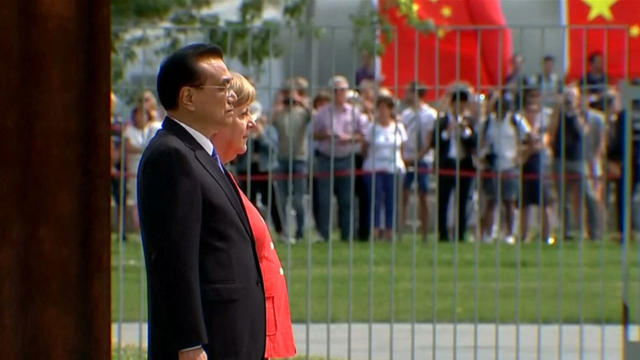China and Germany standing together against protectionism was the theme as Chancellor Angela Merkel met with Chinese Premier Li Keqiang in Berlin.
Trade, investments and business deals were high on the agenda. The meeting comes at a time when China and the European Union are engaged in trade disputes with the United States.
CGTN’s Guy Henderson reports from Berlin.
Inside the German Chancellery, economic cooperation was top of the agenda. One of Germany’s largest companies signed a deal that could see it open a chemical production site in China without a local partner.
Until last month, that wasn’t allowed as China eased restrictions on foreign investments. “BASF’s investment shows new possibilities for participation in China: it no longer has to be a joint venture. In automobile production, there are also new possibilities to get more than a 50 percent participation which shows that China’s market opening in these areas is not just words but that deeds follow,” German Chancellor Angela Merkel said at a joint news conference.
Human rights were also part of that opening up, according to Chinese Premier Li Keqiang. “Free trade is important for both sides and for the revival of the world economy. We have also addressed human rights issues and activities by civil society in China,” Li said.
But it was an escalating trade war that worried both the Chinese and German leaders the most. A trade conflict that U.S. President Donald Trump has threatened to further escalate.
Chancellor Angela Merkel told business leaders in Berlin that there were ways to lessen the effects. “I hope that the upcoming EU-China summit in China brings more progress such as in investment protection agreements. I also hope that Germany and China can make a contribution towards ensuring that the world does not end up blundering into a spiral of trade conflicts,” explained Merkel. Those conflicts could hit the world’s three largest exporters, China, U.S. and Germany, hardest of all.
‘The German government shares some U.S. concerns about China’s economic policies. But it also views Washington’s chosen method of countering them as disastrous. And Beijing agrees. So, Li and Merkel were under pressure to show that their way, one of multilateralism, works better than Donald Trump’s.
 CGTN America
CGTN America
 German Chancellor Merkel welcomes Chinese Premier Li for talks on trade relations. Both say they’re committed to a rules-based trade system.
German Chancellor Merkel welcomes Chinese Premier Li for talks on trade relations. Both say they’re committed to a rules-based trade system.
